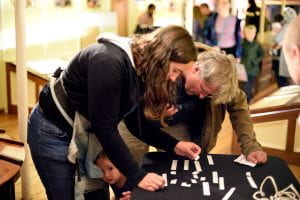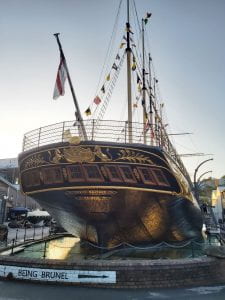At FUTURES, an evening held recently at the SS Great Britain in Bristol as part of a Europe-wide series of events celebrating academic research, I spoke to families about the experience of being at sea. What is it like, we pondered, to spend days – or even weeks – without sight of land? What might happen, in such circumstances, to your sense of personal or national identity? How would you pass the time, and how might you interact with others – often from very different backgrounds – in the same enclosed environment?
Drawing on my research on shipboard cultures and the cultural practices that help define and redefine them, I set up three activities to help visitors think about what it might mean to enter on a nautical existence. First, I asked them to match up maritime terms to their definitions. Illuminating the extent to which British culture has developed through oceanic ventures, many English terms and expressions (‘fathom’, ‘the bitter end’, ‘aloof’, ‘clean bill of health’) have maritime origins. Over the centuries, and often by borrowing terms from other maritime cultures (Dutch, Indian, Portuguese), a distinct ‘language of the sea’ has developed, informing and informed by ‘landlubber’ language. My activity asked participants to match up three sets of words and definitions, ranging from ‘Apprentice’ level (‘capsize’, ‘convoy’), to ‘Midshipman’ level (‘ballast’, ‘bowsprit’), to ‘Skipper’ level (‘futtocks’, ‘cats’ paws’).

Taking advantage of my surroundings, my second activity asked children to compose diary entries in which they imagined themselves on board the SS Great Britain in the nineteenth century, bound for Australia on a two-month voyage. To help them think themselves into this scenario, I provided excerpts from three diaries composed by passengers who had travelled on the ship: one an Irish nun heading to Australia to teach in a Catholic school; the other two men on the same voyage, but experiencing it very differently from their steerage- and cabin-class accommodation. The children were, for the most part, horrified by the idea that modern entertainment systems would be unavailable. After a look of despondency and resignation, one finally wrote: ‘Day 1: I had food and read for an hour!’ A second, apparently (like me) impressed and unnerved by the warren-like design of the SS Great Britain, wrote: ‘Day 3: I played hide and seek and I got lost. I had to sleep under the coffee table.’ Perhaps sensitive to the tedium and frustration that can easily build up over a long voyage – tedium and frustration, which cultural activities, including diary-writing, were designed to alleviate – a third participant wrote: ‘Day 50: I threw my homework in the sea.’ (An environmentalist aside: this child also seemed to sense that dangerous predilection humans have to treat the sea as a giant toilet bowl: a repository for all the things we do not want, whether nuclear waste, by-catch, sin, or corpses we would rather did not become pilgrimage sites.)
The first and second activities overlapped. As my research has indicated, inexperienced seafarers are often struck – and often disoriented – by the ‘salty’ language spoken by sailors, and one indication that they are beginning to ‘get their sea legs’ is their attempt to try out this language in diary entries. One of my participants was obliging enough to do the same, test-driving two terms he had only just taken on board: ‘Day 7: We went into a convoy with other ships and I pretended to be the skipper.’

The third activity was knot-tying: a practice that is nautical, but not exclusively so. It is often argued by scholars in oceanic studies that we live in a ‘sea-blind’ culture, neglecting the oceans on which we still rely for our day-to-day existence – with the vast majority of international trade carried by ships, and communications cables tracing the seafloor – yet which, due to the mechanisation of shipping and the advent of air travel, no longer feel part of our everyday world. If this is so, then what has happened to this specific skill, knot-tying? The answer appears to be that it has passed on to amateur climbers; there were several of them at the SS Great Britain, and they were able to tie far more knots than me.
It was this question of the place of the sea in our culture – and our capacity to remain blind to the oceans – that I was trying to draw out during my conversations across the evening. The stall across from me was, rather wonderfully, asking children to think about what was inside their mobile phones, and so I asked those who came over to me afterwards how long they thought their phones might have spent at sea, and who might have been working on the ship that carried them over the oceans. We don’t tend to think of our phones, or clothes, or appliances, as ‘maritime’ objects; it is – to me at least – strange to think of them in mid-ocean, thousands of miles from shore. The strangeness of this thought is an indication of how easy it is to imagine the sea – as it has so often been imagined, in most cultures – as ‘alien’, beyond the human realm, even when our everyday lives – the very words we speak – are in so many ways structured through human relations with the oceans. My aim, in the helpful surroundings of the SS Great Britain, was to ask participants to reflect on some of the implications of sea-blindness. What might it mean, for example, for climate change? How often do we reflect on the labour conditions not only of those who make the objects we consume, but who transport them? If we are going to continue to exploit the ocean (the seabed, the fish, the manganese nodules), then who should get to decide how we do so? And if we fail to look directly at the sea, what does that mean for the migrants trying, in far less secure and well-appointed surroundings than the SS Great Britain, to cross it?

